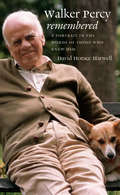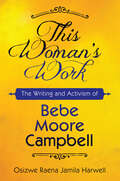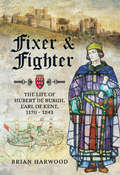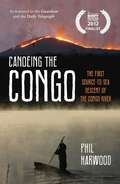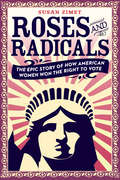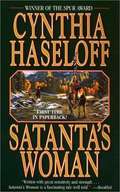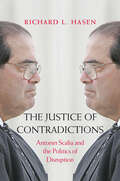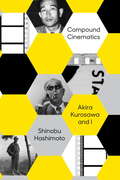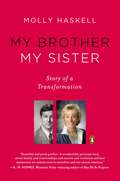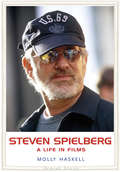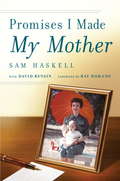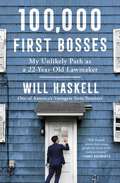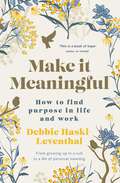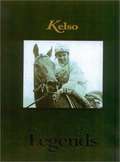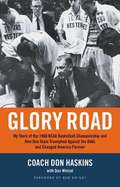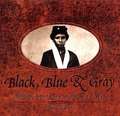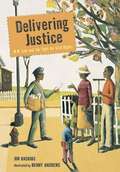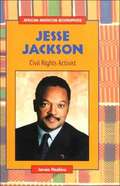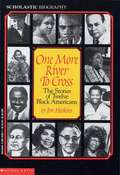- Table View
- List View
Walker Percy Remembered
by David Horace HarwellWalker Percy (1916-1990), the reclusive southern author most famous for his 1961 novel The Moviegoer, spent much of his adult life in Covington, Louisiana. In the spirit of traditional southern storytelling, this biography of Percy takes its shape from candid interviews with his family, close friends, and acquaintances. In thirteen interviews, we get to know Percy through his lifelong friend Shelby Foote, Percy's brothers LeRoy and Phin, his former priest, his housekeeper, and former teachers, among others--all in their own words. Over the course of the interviews, readers learn intimate details of Percy's writing process; his interaction with community members of different ethnic, religious, and socioeconomic backgrounds; and his commitment to civil rights issues. What emerges is a multidimensional portrait of Percy as a man, a friend, and a family member.
This Woman's Work: The Writing and Activism of Bebe Moore Campbell (Margaret Walker Alexander Series in African American Studies)
by Osizwe Raena HarwellThis Woman's Work presents a social history and critical biography based on the life of award-winning writer Bebe Moore Campbell (1950-2006). It offers the personal story of a popular novelist, journalist, and mental health advocate. This book examines Campbell's life and activism in two periods: first, as a student at the University of Pittsburgh during the 1960s black student movement and, second, as a mental health advocate near the end of her life in 2006. It describes Campbell's activism within the Black Action Society from 1967 to 1971 and her negotiation of the Black Nationalist ideologies espoused during the 1960s. The book also explores Campbell's later involvement in the National Alliance on Mental Illness (NAMI), her role as a national spokesperson, and the local activism that sparked the birth of the NAMI Urban-Los Angeles chapter, which served black and Latino communities (1999-2006).Adjacent to her activist work, Campbell's first novel, Your Blues Ain't Like Mine, connects to her emerging political consciousness (related to race and gender) and the concern for racial violence during the US black liberation period from 1950 to 1970. Similarly Campbell's final novel, 72 Hour Hold, is examined closely for its connection to her activism as well as the sociopolitical commentary, emphasis on mental health disparities, coping with mental illness, and advocacy in black communities. As a writer and activist, Campbell immersed her readers in immediately relevant historical and sociopolitical matters. This Woman's Work is the first full-length biography of Bebe Moore Campbell and details the seamless marriage of her fiction writing and community activism.
Fixer & Fighter: The life of Hubert de Burgh, Earl of Kent, 1170 – 1243
by Brian HarwoodHubert de Burgh rose from obscure beginnings to become one of the most powerful men in England. He loyally served first King John and then the young Henry III and played a crucial role in saving the Plantagenet dynasty when it was at its most vulnerable. During King Johns disastrous wars in France, Hubert held Chinon castle against the besieging French for a whole year. He remained loyal when the Barons rebelled against John and, when they invited French invaders to intervene, Hubert successfully held Dover Castle for the king against a siege led by the French Prince Louis. After Johns death, he held it for the new king, 9-year old Henry, against a renewed siege. In August 2017 he struck the final blow against the French invasion, which still held London, when he defeated a powerful fleet carrying French reinforcements at the naval Battle of Sandwich. Hubert continued to serve Henry III, making important reforms as Justiciar of England and leading military campaigns against the Welsh Prince Lewellyn. He eventually lost favour due to the machinations of his rivals and narrowly avoided execution but was eventually reconciled with his king and able to die a peaceful death. Incredibly, this is the first full-length biography of this remarkable man.
Canoeing the Congo: The First Source-to-Sea Descent of the Congo River
by Phil HarwoodEx-Marine Phil Harwood embarked on an epic solo journey on the Congo, the eighth longest river in the world. He faced swamps, man-eating crocodiles, snakes and spiders’ webs the size of houses. He collapsed from malaria, and was arrested. But he also received tremendous hospitality from proud people long forgotten by the Western world.
Canoeing the Congo: The First Source-to-Sea Descent of the Congo River
by Phil HarwoodEx-Marine Phil Harwood embarked on an epic solo journey on the Congo, the eighth longest river in the world. He faced swamps, man-eating crocodiles, snakes and spiders’ webs the size of houses. He collapsed from malaria, and was arrested. But he also received tremendous hospitality from proud people long forgotten by the Western world.
Roses and Radicals: The Epic Story of How American Women Won the Right to Vote
by Todd Hasak-Lowy Susan ZimetThe United States of America is almost 250 years old, but American women won the right to vote less than a hundred years ago. <P><P>And when the controversial nineteenth amendment to the U.S. Constitution-the one granting suffrage to women-was finally ratified in 1920, it passed by a mere one-vote margin. <P><P>The amendment only succeeded because a courageous group of women had been relentlessly demanding the right to vote for more than seventy years. The leaders of the suffrage movement are heroes who were fearless in the face of ridicule, arrest, imprisonment, and even torture. Many of them devoted themselves to the cause knowing they wouldn't live to cast a ballot. <P><P>The story of women's suffrage is epic, frustrating, and as complex as the women who fought for it. Illustrated with portraits, period cartoons, and other images, Roses and Radicals celebrates this captivating yet overlooked piece of American history and the women who made it happen.
Tanker Pilot: Lessons from the Cockpit
by Mark HasaraFrom a veteran air-refueling expert who flew missions for over two decades during the Cold War, Gulf War, and Iraq War comes a thrilling eyewitness account of modern warfare, with inspirational stories and crucial lessons for people on the battlefield, in boardrooms, and in their everyday lives.Get a glimpse of life in the pilot&’s seat and experience modern air warfare directly from a true American hero. Lt. Col Mark Hasara—who has twenty-four years&’ experience in flying missions around the world—provides keen and eye-opening insights on success and failure, and emphasizes the importance of always being willing to learn.He provides twelve essential lessons based on his wartime experience and his own personal photographs from his missions during the Cold War, Gulf War, and Iraq War. With a foreword by #1 New York Times bestselling author and radio host Rush Limbaugh, this is a military memoir not to be missed.
Satanta's Woman
by Cynthia HaseloffIn 1864 the frontier cavalry had been entered to fight in the War Between the States, and the able-bodied men had enlisted to join the cause.
The Justice of Contradictions: Antonin Scalia and the Politics of Disruption
by Richard L. Hasen“Superbly written, filled with brilliant insights . . . Both liberals and conservatives will see Scalia and his legacy in a new and more illuminating light.” —Adam Winkler, author of Gunfight: The Battle Over the Right to Bear Arms in AmericaEngaging but caustic and openly ideological, Antonin Scalia was among the most influential justices ever to serve on the United States Supreme Court. In this fascinating new book, legal scholar Richard L. Hasen assesses Scalia’s complex legacy as a conservative legal thinker and disruptive public intellectual.The left saw Scalia as an unscrupulous foe who amplified his judicial role with scathing dissents and outrageous public comments. The right viewed him as a rare principled justice committed to neutral tools of constitutional and statutory interpretation. Hasen provides a more nuanced perspective, demonstrating how Scalia was crucial to reshaping jurisprudence on issues from abortion to gun rights to separation of powers. A jumble of contradictions, Scalia promised neutral tools to legitimize the Supreme Court, but his jurisprudence and confrontational style moved the Court to the right, alienated potential allies, and helped to delegitimize the institution he was trying to save.“Absorbing . . . [a] book that, at least for this reader, shed new light on the law and how it is made, interpreted, and applied.” —Los Angeles Review of Books
Compound Cinematics
by Shinobu HashimotoAny list of Japan's greatest screenplay writers would feature Shinobu Hashimoto at or near the top. This memoir, focusing on his collaborations with Akira Kurosawa, a gifted scenarist in his own right, offers indispenable insider account for fans and students of the director's oeuvre and invaluable insights into the unique process that is writing for the screen. The vast majority of Kurosawa works were filmed from screenplays that the director co-wrote with a stable of steller writers, many of whom he discovered himself with his sharp eye for all things cinematic. Among these was Hashimoto, who caught the filmmaker's attention with a script that eventually turned into Roshamon. Thus joining Team Kurosawa the debutant immediately went on to paly an integral part in developing and writing two of the grandmaster's most impressive achievements, Ikiru and Seven Samurai.
My Brother My Sister
by Molly HaskellA feminist film critic’s thoughtful, outspoken memoir about transgender and family On a visit to New York, the brother of well-known film critic Molly Haskell dropped a bombshell: Nearing age sixty, and married, he had decided to become a woman. In the vein of Jan Morris’s classic Conundrum and Jennifer Finney Boylan's She's Not There, a transgender memoir, Haskell’s My Brother My Sister gracefully explores a delicate subject, this time from the perspective of a family member. Haskell chronicles her brother Chevey’s transformation through a series of psychological evaluations, grueling surgeries, drug regimens, and comportment and fashion lessons as he becomes Ellen. Despite Haskell’s liberal views on gender roles, she was dumbfounded by her brother’s decision. With candor and compassion, she charts not only her brother’s journey to becoming her sister, but also her own path from shock, confusion, embarrassment, and devastation to acceptance, empathy, and love. Haskell widens the lens on her brother’s story to include scientific and psychoanalytic views. In an honest, informed voice, she has revealed the controversial world of gender reassignment and transsexuals from both a personal and a social perspective in this frank and moving memoir. .
My Brother My Sister
by Molly HaskellA feminist film critic's thoughtful, outspoken memoir about transgender and family On a visit to New York, the brother of well-known film critic Molly Haskell dropped a bombshell: Nearing age sixty, and married, he had decided to undergo sugery to become a woman. In the vein of Jan Morris's classic Conundrum and Jennifer Finney Boylan's She's Not There, a transgender memoir, Haskell's My Brother My Sister gracefully explores a delicate subject, this time from the perspective of a family member. Haskell chronicles her brother Chevey's transformation through a series of psychological evaluations, grueling surgeries, drug regimens, and comportment and fashion lessons as he becomes Ellen. Despite Haskell's liberal views on gender roles, she was dumbfounded by her brother's decision. With candor and compassion, she charts not only her brother's journey to becoming her sister, but also her own path from shock, confusion, embarrassment, and devastation to acceptance, empathy, and the pleasure of having a sister. Haskell widens the lens on her brother's story to include scientific and psychoanalytic views. In an honest, informed voice, she has revealed the controversial world of gender reassignment and transsexuals from both a personal and a social perspective in this frank and moving memoir.
Steven Spielberg: A Life in Films
by Molly HaskellA film-centric portrait of the extraordinarily gifted movie director whose decades-long influence on American popular culture is unprecedented “Everything about me is in my films,” Steven Spielberg has said. Taking this as a key to understanding the hugely successful moviemaker, Molly Haskell explores the full range of Spielberg’s works for the light they shine upon the man himself. Through such powerhouse hits as Close Encounters of the Third Kind, E.T., Jurassic Park, and Indiana Jones, to lesser-known masterworks like A.I. and Empire of the Sun, to the haunting Schindler’s List, Haskell shows how Spielberg’s uniquely evocative filmmaking and story-telling reveal the many ways in which his life, work, and times are entwined. Organizing chapters around specific films, the distinguished critic discusses how Spielberg’s childhood in non-Jewish suburbs, his parents’ traumatic divorce, his return to Judaism upon his son’s birth, and other events echo in his work. She offers a brilliant portrait of the extraordinary director—a fearful boy living through his imagination who grew into a man whose openness, generosity of spirit, and creativity have enchanted audiences for more than 40 years.
Promises I Made My Mother
by Sam Haskell David RensinWhat would my mother say? How would she want me to handle this situation? How can I make this tough decision and stay true to myself? What would my mother say? Sam Haskell still asks himself these questions every day. When Haskell was young, his devoted mother, Mary, instilled in her son the values of character, faith, and honor by setting an example and asking him to promise to live his life according to her lessons. He did, and those promises have served Haskell consistently from his Mississippi boyhood to his long career at the venerable William Morris Agency in Beverly Hills. In this inspiring memoir full of touching stories and amusing anecdotes, Haskell reveals how he kept his pledge to his mother to live a decent life - even in the shark-infested waters of Hollywood, where he handled the hottest stars and packaged the highest-rated shows - by refusing to become the cliché of an amoral agent. Here is Haskell as a child in Amory, Mississippi (pop. 7,000), discovering the power of hope as he waits for an unlikely visit from the "Cheer Man" (a representative of the detergent company who gave ten dollars to anyone using the brand), learning humility after pursuing an eighth-grade "Good Citizenship" award he cockily assumed he'd win, confronting the complications of human character when a near-fatal car crash exposed his judgmental father's true nature. Years later, in Hollywood, Haskell would rely on his mother's teachings - honesty, self-reliance, and belief in God - as he swiftly rose from the William Morris mailroom to eventually become the company's Worldwide Head of Television. His capacity for friendship and his insistence on living his version of the Golden Rule (being "thoughtfully political") allowed him to handle various client crises and the tense negotiations that nearly scuttled the last years of Everybody Loves Raymond and the entire existence of The Fresh Prince of Bel-Air. Haskell has achieved success through self-respect, and from his story we learn how we, too, can maintain our dignity when faced with life's challenges. This stirring memoir is a testament to mothers everywhere who instill in their sons the lasting values they need to become good men and devoted fathers. From the Hardcover edition.
100,000 First Bosses: My Unlikely Path as a 22-Year-Old Lawmaker
by Will HaskellThe underdog story of Will Haskell, who became a Democratic state Senator in 2018 at age twenty-two—taking on an incumbent who had been undefeated for Haskell&’s entire life and earning an endorsement from President Obama—and is determined to pave the way for his peers to transform government from the bottom up.President Obama left office with these parting words for Americans: &“If you&’re disappointed by your elected officials, grab a clipboard, get some signatures, and run for office yourself.&” Twenty-two-year-old Will Haskell decided to do just that. If he ran for office and won, he would become the youngest state Senator in Connecticut history. For years, Haskell&’s hometown had reelected the same politician who opposed passing paid family leave, fought increases in the minimum wage, and voted down expansions of voting rights. Haskell&’s own vision for Connecticut&’s future couldn&’t be more different, and he couldn&’t stand the idea of an uncontested election. In 2018, he would be a college grad looking for his first job. Why not state Senator? When Haskell kicks off his campaign in the spring of his senior year, he&’s an unknown college kid facing a popular incumbent who&’s been in office for over two decades—as long as Haskell&’s been alive. Haskell&’s campaign manager is his roommate and his treasurer is his girlfriend&’s mom. He doesn&’t have any professional experience. But he does have a powerful message: there&’s no minimum age to being on the right side of history. Six months later, Haskell&’s shocking upset victory gives him a historic seat in the state Senate and the responsibility to serve the 100,000 constituents in his district. Like any first job, his first term as a legislator is filled with trial and error. Creating a program that funds free tuition at Connecticut&’s community colleges—nice work. Falling asleep on the senate floor—needs improvement. In the tradition of Pete Buttigieg&’s Shortest Way Home and Greta Thunberg&’s No One Is Too Small to Make a Difference, 100,000 First Bosses is the story of how one twentysomething candidate waged the campaign of his young life, fought for change at the state capitol, and proved that his generation is ready to claim a seat at the table.
Make it Meaningful: Finding Purpose in Life and Work
by Debbie Haski-LeventhalUnorthodox meets Start with Why: how escaping a cult led Debbie Haski-Leventhal to become a &‘professor of purpose&’ and master the art of finding personal meaning in life. When she was five, tragedy prompted her parents to join Kabbalah, a cult-like sect of Judaism. They immersed themselves in it unreservedly – from its peculiar rituals (rolling in the snow naked to purify their sins) to the beauty of belonging to something greater than themselves. She left at eighteen – after years of abuse and living in communes in three countries – devastated and isolated, searching for meaning in her life. Today, that woman is Professor Debbie Haski-Leventhal, who specialises in finding meaning in our personal and professional lives. In this book, Debbie shares her own and other people&’s stories to explore ideas of purpose, impact, values, and resilience. She sheds light on the &‘meaning&’ of meaningfulness, offers frameworks for meaningfulness in life, and suggests ways in which purpose can help make our lives and work more significant and valuable. In the age of &‘The Great Resignation&’, we&’re all trying to discover a more deliberate and rewarding shape to our own lives. Debbie Haski-Leventhal is the perfect companion for the journey.
Kelso (Thoroughbred Legends #21)
by Steve HaskinNo racehorse of modern times was so good for so long. Racing until the age of nine, Kelso won thirty-nine of sixty-three races. This superstar of the 1960s earned an unprecedented five Horse of the Year titles, five divisional championships, set or equaled eight track records, and set three American standards. Much like Seabiscuit thirty years earlier, Kelso kept getting better as he got older, earning legions of fans with every passing year.
Glory Road: My Story of the 1966 NCAA Basketball Championship and How One Team Triumphed Against the Odds and Changed America Forever
by Don Haskins Dan WetzelIn 1966, college basketball was almost completely segregated. In the championship game for the NCAA title that year, Don Haskins, coach of the then little-known Texas Western College, did something that had never been done before in the history of college basketball. He started five black players, and in the now legendary game, unseated the nationally top-ranked University of Kentucky. Broadcast on television throughout the country, the Miners victory became the impetus for the desegregation of all college teams in the South during the next few years. Now, for the first time, Hall of Fame coach Don Haskins tell his story. Beginning as a small-town high school basketball coach, Haskins was known for his tough coaching methods and larger-than-life personality. As a child growing up during the Dust Bowl in Oklahoma, he developed a strong set of values and discipline that he would instill in his players throughout his coaching career. With recollections from his former players, including those of the 1966 team, along with Haskins's own Seven Principles for Success, Glory Road is the inspiring story of a living legend and one of the most respected coaches of all time. With a foreword by basketball legend Bobby Knight, and coinciding with the release of the film Glory Road, the story of Don Haskins and his championship team is sure to become a classic for sports fans and historians.
Diana Ross: Star Supreme (Women of Our Time)
by James HaskinsFrom the Book jacket: From the Author: I started writing books for young people when I was an elementary-school teacher. I wanted my students to read more, and I began to write books about things that they were interested in. They liked to read about people who were famous and how they got to be famous. Most of my students were black, and I wanted them to have books about black people who had overcome poverty and discrimination. These kinds of books were not available when I was growing up in the South. In fact, I could not even use the public library, because I was black. Although Diana Ross grew up in Detroit, not the South, she had to overcome a lot of barriers because she was poor and black. I have followed her career ever since she began singing with the Supremes. When she played Billie Holiday in Lady Sings the Blues, I became even more interested. She was "stretching" her talents. She wasn't content just to be a singer. I feel that she has a lot of courage and has taken many risks in her career. Many newspaper and magazine articles have been written about Diana Ross. Many of these articles are on microfilm or in large, bound magazine volumes in the library. It was interesting to go through these articles and read what she said years ago. It was fun to look at pictures from twenty years back. Styles in hair and clothing have changed so much. People change, too. The important thing is whether or not they feel good about the changes, whether or not they are able to grow in spirit. Diana Ross has. J.H.
The Story of Stevie Wonder
by James HaskinsA biography of the blind composer, pianist, and singer who was a child prodigy and went on to win nine Grammy awards.<P><P>Winner of the Coretta Scott King Medal
Black, Blue, and Gray: African Americans in the Civil War
by Jim HaskinsFour-time Coretta Scott King Honor Award winner Jim Haskins brings readers face-to-face with the African Americans who fought in the war between the states. Excerpts from letters and government documents introduce the names and places that set the stage for the war's unfolding. Vintage photographs offer a vivid look at the brave soldiers who risked their lives in the fight for human equality [This text is listed as an example that meets Common Core Standards in English language arts in grades 9-10 at http://www.corestandards.org.]
Delivering Justice: W. W. Law and the Fight for Civil Rights
by Jim HaskinsA respected biographer teams up with an acclaimed artist to tell the story of the mail carrier who orchestrated the Great Savannah Boycott -- and was instrumental in bringing equality to his community. "Grow up and be somebody," Westley Wallace Law's grandmother encouraged him as a young boy living in poverty in segregated Savannah, Georgia. Determined to make a difference in his community, W.W. Law assisted blacks in registering to vote, joined the NAACP and trained protesters in the use of nonviolent civil disobedience, and, in 1961, led the Great Savannah Boycott. In that famous protest, blacks refused to shop in downtown Savannah. When city leaders finally agreed to declare all of its citizens equal, Savannah became the first city in the south to end racial discrimination. A lifelong mail carrier for the U.S. Postal Service, W.W. Law saw fostering communication between blacks and whites as a fundamental part of his job. As this affecting biography makes clear, this "unsung hero" delivered far more than the mail to the citizens of the city he loved.
Jesse Jackson: Civil Rights Activist
by Jim HaskinsPresents the life, accomplishments, and goals of the civil rights activist and politician Jesse Jackson, from his childhood in North Carolina through his years in Chicago and Washington, D.C.
One More River To Cross: The Stories Of Twelve Black Americans
by Jim HaskinsPresents brief biographies of twelve African Americans who courageously fought against racism to become leaders in their fields, including Marian Anderson, Ralph Bunche, Fannie Lou Hamer, and Malcolm X.
Shirley Temple Black: Actress to Ambassador (Women of Our Time)
by Jim HaskinsShirley Temple, "America's Sweetheart," was the most popular movie star of the 1930s. During the Great Depression, her bubbly personality, blond curls, and dimples helped Americans forget their own hard times. As an adult, she entered politics, serving as the first woman Chief of Protocol at the White House; she went on to become the U.S. delegate to the United Nations and then Ambassador to Ghana. Today she remains active in many causes and is a well-know political figure -- cherished by millions as their favorite child star.
